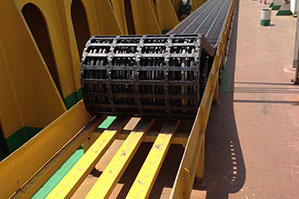What does “heavy duty” mean in the context of e-chains?
Tim Schneebeck | 1. April 2020
If you enter “heavy duty” into a search machine, you will find lots of explanations of the term. But an exact definition is difficult to find.
Of course, this is primarily because it is an English term. Explanations can be found in the descriptions of equipment and machines.
“Heavy duty” means “able to withstand unusual strain”. So, it refers to an application with much higher loads and, perhaps, more difficult operating conditions. An example is the difference between an indoor crane and an offshore crane. Both applications are cranes, but the operating conditions for an offshore crane (which is exposed to weather) are much more difficult than those to which an indoor crane is exposed.
And this is just where the difference is. If equipment or machines are designated “heavy duty”, they have been specifically developed for difficult environments – for tough work, so to speak.

The term “heavy duty” is often used in connection with specific industries. The oil and gas, mining and offshore industries are prominent examples.
In the igus energy chain segment, we refer to the E4.1 series of avy-duty e-chains. This series is highly stable and able of handling push/pull forces. They are the all-rounders for any application. This is why this energy chain series is the standard in oil and gas and offshore industry applications. The same is true, by the way, of plug connectors in readychain systems. Here, “heavy duty” can mean great current carrying capacity or especially tough material handling.
More information about plastic energy chains for the offshore and oil & gas industries.
LinkedIn: http://bit.ly/igus_LinkedIn
